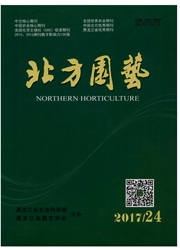

 中文摘要:
中文摘要:
以"上海青"小白菜为研究对象,利用田间模拟试验,研究了铅污染不同程度土壤施用不同保水剂用量对小白菜生长与物质产量、氮磷钾养分吸收与利用效率的差异。结果表明:土壤铅污染加重不利于蔬菜生长与养分吸收利用,施用保水剂改良污染土壤能够影响蔬菜的生长和吸收利用氮磷钾养分,但影响程度受污染程度和保水剂用量综合制约。铅污染土壤上施用保水剂可增加蔬菜生物量10.0%~23.3%,在铅污染较轻土壤上加大保水剂用量和污染较重土壤上施用较小剂量保水剂更有利于蔬菜生长。适宜的保水剂用量促进氮磷钾养分吸收积累,且随生长天数增加而表现愈明显;保水剂施用提高了养分利用率,但不同养分种类间有所差异。铅污染较轻土壤施用较大剂量和污染较重土壤上施用较小剂量保水剂改良铅污染土壤能综合提高氮磷钾养分利用效率。保水剂1.2g/kg干土用量相对2.4g/kg干土用量改良铅污染土壤,实现蔬菜提产增效。
 英文摘要:
英文摘要:
Taking ‘Shanghai Qing'Chinese cabbage as material,the effect of different levels of water retaining agents(WRA)applied to different degrees of soil polluted by lead(SPL)on the growth and biomass of Chinese cabbage were studied.The absorbability of nitrogen(N),phosphorus(P)and potassium(K)and their utilization efficiencies by simulated field experiment were determined.The results showed that adding SPL was disadvantaged with the growth of vegetable and absorption and utilization of nutrients.Effect of WRA application in improvement of polluted soil on vegetable growth and absorption and utilization of N,P and K nutrients were controlled by pollution degree and level of WRA application together.WRA applied to soil polluted by lead could promote the growth of vegetable and increase its biomass by 10.0%-23.3%.Moreover,larger level of WRA application in lower SPL and smaller application level of WRA in SPL were advantaged with the growth of vegetable.Moderate level of WRA promoted the uptake and utilization of vegetable plant to N,P and K nutrients,which was more obvious with growth development;WRA application improved the utilization efficiencies of fertilizer N,P and K,which was different within different nutrient sort.Lager level of WRA application in lower SPL and smaller that in higher SPL applied to improve SPL could generally increase utilization efficiency of N,P and K nutrients.The increases of utilization efficiencies of N,P and K nutrients and vegetable biomass together were better with level of WRA application with 1.2g/kg dry soil in SPL improvement compared with 2.4g/kg dry soil.
 同期刊论文项目
同期刊论文项目
 同项目期刊论文
同项目期刊论文
 期刊信息
期刊信息
